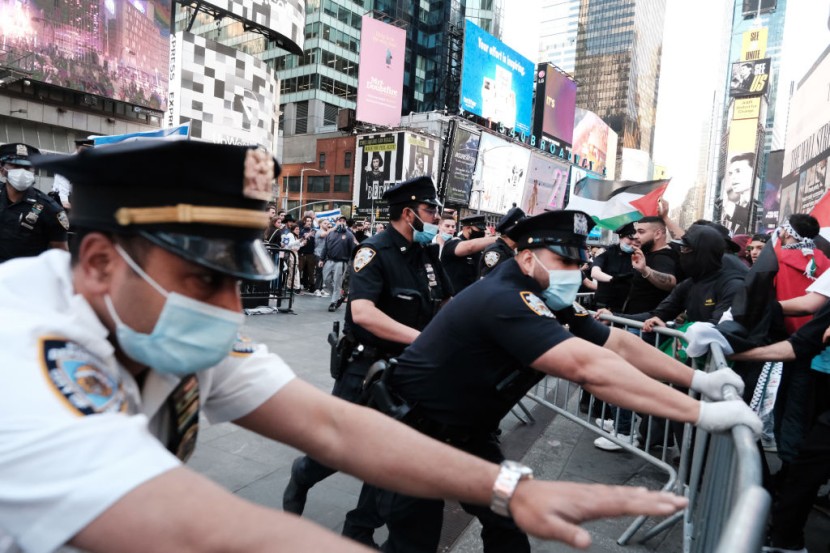Starbucks has accused a union, which represents thousands of its baristas, of damaging the brand and putting co-workers at risk due to a pro-Palestinian tweet.
With the backlash for his public statements suggesting that Israel was committing war crimes, the CEO of a prominent tech conference has resigned. The company executives committed not hiring individuals from university student groups that criticized Israel, as per KATU News.
CEOs Grapple With Speaking Out on Global Conflicts

On Wednesday's quarterly earnings call, before Adena Friedman presented Nasdaq's financial results, the stock exchange's CEO stated that the company was "horrified by the acts of terrorist violence" in Israel and condemned "the subsequent loss of innocent lives in Israel, Gaza, and the wider region."
She echoed similar statements by the CEOs of Goldman Sachs Group, BlackRock, United Airlines Holdings, and other companies, who are under increasing pressure to speak out about a conflict in which the human toll is rising by the hour.
Crisis communications experts report that their phones vibrate out of their pouches as CEOs seek assistance calibrating their internal and external messages.
As the third-quarter earnings season progresses, many companies will be compelled to address investors, employees, and other stakeholders who have come to expect their corporate leaders to weigh in on global events.
CEOs are "all asking the same question," according to Davia Temin, proprietor of the New York-based crisis management consulting firm Temin and Company. "If you utter something, what you say matters.
But you are also at risk if you remain silent because silence is a statement; therefore, silence is also controversial."
The public messages filtering out on earnings calls represent a shift from the days immediately following the brutal attack on Israel on October 7 and the subsequent retaliation against Hamas.
As of October 17, only about a fifth of the 100 largest S&P 500 companies had issued formal statements regarding the conflict. In contrast, nearly all published public comments regarding the Russia-Ukraine conflict.
This has prompted some employees to criticize their corporate leaders for not speaking up sooner. Consider the fact that Nike has not issued a public statement.
CEO John Donahoe condemned the "horrific attacks in Israel, the tragic loss of innocent Israeli and Palestinian lives" in a company-wide message nearly a week after the head of the sneaker manufacturer's Europe, Middle East, and Africa division emailed employees about the violence's "devastating impact."
According to Slack messages seen by Bloomberg in a group for Jewish employees, some employees expressed disappointment with the response.
Nike stated that it does not "condone violence, hatred, or bigotry" and that its campaign includes the International Committee of the Red Cross. This organization primarily operates in Gaza, the West Bank, and Israel, according to Firstpost.
Social Initiatives and Workforce Diversity
In the days following the assault, the director of human resources at Instacart stated that she was "deeply saddened to see the extensive devastation and loss of life across the Middle East."
Nevertheless, according to internal Slack messages viewed by Bloomberg News, workers at the grocery delivery company questioned why senior leadership remained reticent and why the diversity and equity team did not provide more support.
Instacart CEO Fidji Simo joined the fray three days later, lamenting the "horrific terrorist attacks on Israel." Several hours later, she posted another message mourning "the loss of all innocent lives" - "Israeli, Arab, and Muslim alike."
In 2021, Instacart announced a partnership with the Israeli technology company Fabric. CEO Bill Anderson's LinkedIn post condemning "acts of terror against civilians" was greeted with a deluge of comments taking offense at his statement of "solidarity with the people of Israel," where Bayer has about 150 employees.
Workers resisted a "one-sided" condemnation of violence, as described by a sales specialist. Similarly, the chief operating officer of Procter & Gamble Co. addressed the issue on an internal message board. Still, the company did not issue a public statement or address the conflict on Wednesday's earnings call.
The Israel-Hamas conflict erupts during a debate over the roles of corporations in social and diversity initiatives and the expectations of global company executives overseeing large, diverse workforces. "Once you enter this game, there is no way out.
This is the current expectation, post-George Floyd, according to Paul Argenti, professor of corporate communications at Dartmouth's Tuck School of Business. While there was widespread condemnation of George Floyd's death, businesses have begun to limit their public statements on controversial subjects to avoid alienating customers and investors.
Global enterprises with expansive franchisee operations, such as McDonald's, or collaborating with other stakeholders, such as Airbnb, are being dragged unwillingly into the fray. Following the appearance of photos and videos on Instagram depicting franchised McDonald's restaurants in Israel serving the Israeli military, demands to boycott the fast food chain spread across social media.
Saudi Arabian, Malaysian, and Pakistani operators renounced the actions. The Israeli franchisee verified in an Instagram post that 100,000 meals were donated to soldiers, hospitals, and adjacent residents.
McDonald's CEO, Chris Kempczinski, expressed the corporation's strong condemnation of violence and hate speech. He also expressed deep concern and disturbance regarding acts of antisemitism and Islamophobia.
The message did not explicitly mention Israel or Hamas, nor did it directly address the tensions among franchisees in the region. McDonald's has chosen not to provide a comment, Business Standard reported.
Related Article : Mitch McConnell Shares Update on His Health
© 2025 HNGN, All rights reserved. Do not reproduce without permission.








